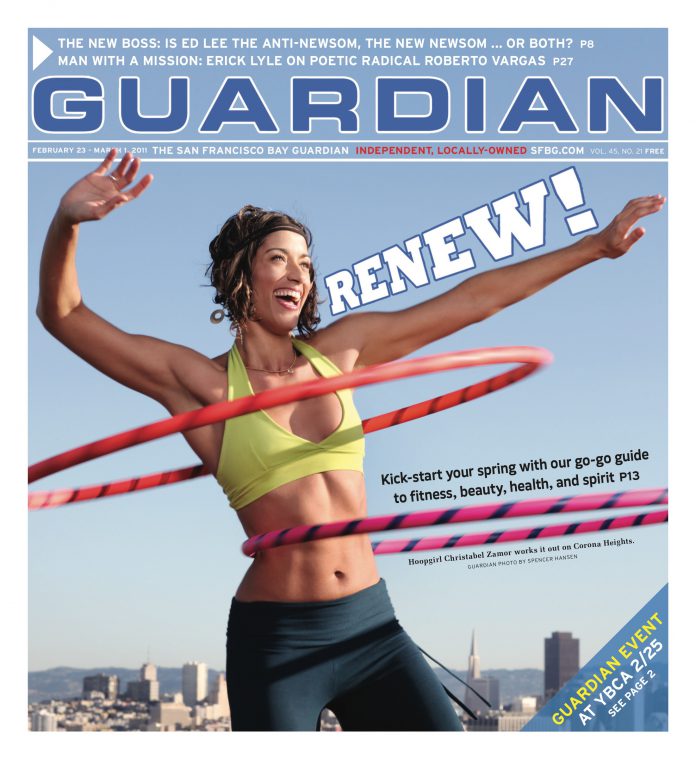Having uprooted from his native Atlanta to chase his musical dreams in L.A., Cody ChestnuTT and his band, the Crosswalk, landed a deal with Hollywood Records and got as far as recording and mixing a debut album, Venus Loves a Melody, before things went south. In 2002, ChestnuTT took his bass, drum machine, keyboard, guitar, organ, microphone, and headphones into his bedroom and single-handedly crafted his debut album, The Headphone Masterpiece (Ready Set Go). The 99-minute double CD contained 39 songs that ranged from Southern-fried rock to hip-hop, and was laced with enough dastardly and divine deeds to provoke any listener. All of it was written, produced, and performed by ChesnuTT on his four-track cassette recorder.
The success of the album is evident in how it permeated the American fabric. ChestnuTT’s fame soared when Grammy Award-winning band the Roots decided to cover his song “The Seed” for its 2002 album Phrenology, with ChestnuTT on guitar and vocals. The video for “The Seed (2.0)” was nominated for an MTV Video Music Award and an MTV 2 Award. The Headphone Masterpiece was nominated for the Shortlist Music Prize in 2003. ChesnuTT’s music figured in Miranda July’s Me and You and Everyone We Know (2005), and his performance in the Dave Chappelle movie Block Party (2005) was a throwback to the days of Wattstax. Thom Yorke of Radiohead considers ChesnuTT a musical genius, and the opening riff to Headphone Masterpiece‘s “Look Good In Leather” has become a ubiquitous commercial ditty.
Though ChesnuTT continued to tour and release singles, it wasn’t until his 2010 reemergence project, the six-track EP Black Skin No Value (Vibration Vineyard), that he truly returned, brandishing a lyrical approach that had evolved beyond the more “profane” content of Masterpiece. In his words, “the EP was a social commentary rooted in spiritual and soul traditions.” Due later this year, his next album, Landing On a Hundred, promises to be as passionate and powerful as the rest of his work. On the eve of a show at Yoshi’s, I caught up with him.
SFBG Why did you title your EP Black Skin No Value?
Cody ChesnuTT I wanted to form something that was ironic. To blend all I think could be a literal application to what I feel is going on. We’re facing a low perception of self-worth in the community — from media, the justice system, and so many different things — and at the same time the content of the body of work itself is in stark contrast. We have to recognize that there’s value in acknowledging or addressing the issue. Off the top, it was an ironic approach to deal with what I feel is a crisis in the community.
SFBG Although there’s community focus in the album, most of the songs seem intimate.
CC Yeah, it’s straightforward. I wanted to take a sound-bite songwriting approach. Straight to the point, to cut through all the noise we’re hearing in the media right now. Something that awakens the spirit in some way, or opens chakras that make sure you’re really paying attention to what we’re facing right now.
SFBG Somewhere between rock, funk, folk, soul, hip-hop, and experimental sounds, The Headphone Masterpiece and its success left you in an interesting position in the world of music. I know you didn’t cultivate this crossroad or gray area, so how do you work within it?
CC I don’t think about it. I just create. I do know that the last experience put me in a position where I had some advantages as an artist that gave me room to do what I wanted to do. That’s the beauty of my career — it set me up to go either way. Gave me the freedom to create whatever I wanted to create. What’s your take on it?
SFBG In The Headphone Masterpiece you’re able to show so many sides in an industry that demands two-dimensionality. You go from “Serve This Royalty” to “Smoke and Love,” then you write “Bitch, I’m Broke” and throw in a lullaby to your son. You’re showing yourself as a fully-formed human being. I feel that kind of complexity confuses the machine.
CC I think that is to my advantage. I was hoping, and still hope, that it will inspire other people to look at the humanity of it all. To not be so focused on sure-thing in-the-box marketing. I think exposing the range of human emotion makes the landscape much more interesting. Not to get too deep off into the philosophical aspects of creativity, but I’m reading a piece on Nietzsche’s self-criticism and The Birth of Tragedy, and [Nietzsche is] saying that after the first three Greek tragedies, there were no more to create — the rest are just copies. That’s why we need to expose the range and bring in new content, because, in my opinion, certain subject matter has been exhausted. There’s more to explore within the spirit. It’s what drives me to do what I do.
SFBG What can we expect from your show?
CC I’m playing all new material with a 10-piece band. I’m really interested into tapping into that root soul music. The kind of music that heals, the kind that touches. It’s what I want to feel and hear right now. And there seems to be a consensus that people really want something a little more substantive, closer to that feeling that they had when they were growing up. Right now is an interesting time to bring back that healing vibration, that element. I’m not the only one doing it. I just want to contribute to what I think is a renaissance, a resurgence, a restoration, so to speak, of soul. So much of the soul has been sapped out of our music.
CODY CHESNUTT
Sat./26, 8 and 10 p.m.; $25
Yoshi’s San Francisco
1330 Fillmore, S.F.
(415) 655-5600

